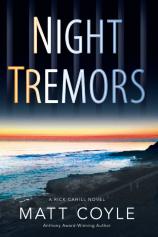Interview: June 4, 2015
Any Matt Coyle book reads like a Raymond Chandler novel, set in tony La Jolla adjacent to San Diego. You’ll be enthralled and intrigued, wince when Rick Cahill’s wrist is broken --- and tuck it away to read again or share with a friend. NIGHT TREMORS, Coyle's second in the hardboiled PI series following YESTERDAY'S ECHO, has Rick taking on “the ugly side of San Diego,” including a corrupt cop who wormed his way to the position of police chief. Coyle chats with Bookreporter.com’s Dean Murphy about the psyche of his protagonist, the craft of writing, his life as an author, and the power of the written word.
Bookreporter.com: YESTERDAY’S ECHO introduced Rick Cahill, a contemporary Philip Marlowe portrayed by Humphrey Bogart in the 1946 film noir, The Big Sleep. Please tell us more about Rick.
Matt Coyle: Rick is an ex-cop who, 10 years after the fact, is still a suspect in his wife’s murder. By the time NIGHT TREMORS begins, he is a private investigator working for a large agency in La Jolla. He’s making a lot of money, but unhappy that he’s stuck on the infidelity detail taking pictures of people doing what they shouldn’t. He has a dark history that grabs at him as he tries to redeem himself and make a life worth living.
BRC: Bookreporter.com dubbed you “a modern-day Raymond Chandler.” How did Chandler’s private investigator protagonist and staccato writing style influence you?
MC: Being compared to Raymond Chandler is the greatest compliment this writer can get. Thanks. I’m certainly not alone in being influenced by Chandler. He had a remarkable impact on the mystery genre, and even literature in general. His protagonist, Philip Marlowe, appealed to me because he did what he thought was right no matter the cost. Plus he always said the things I wished I could say if I had more guts, or wished I had said if I’d thought of it at the time.
Regarding Chandler’s writing style, I don’t think it could or should be duplicated. It’s too good, too iconic, and the sole domain --- at least in novels --- of Philip Marlowe. I’m sure I picked up a lot from Chandler through osmosis after reading his novels and short stories, but I also read a lot of Ross Macdonald, Hemingway and Fitzgerald when I was young. No doubt, I’ve subconsciously stolen from all of them, and I’m grateful to have been raised in a family that revered the written word. If your subconscious is a thief, why not steal from the best? However, when I write, I hear the voice of Rick Cahill. When the line that would open my first novel, YESTERDAY’S ECHO, came to me after many revisions: The first time I saw her, she made me remember and she made me forget, I knew I had the voice of my protagonist.
BRC: Is it coincidence that Rick Cahill shares Chandler’s initials? Why choose that name?
MC: No coincidence. After blaming my subconscious for any theft of Chandler’s style in the previous answer, I consciously take full responsibility for stealing his initials. It’s an unapologetic nod to my biggest literary influence.
The actual choice of names took a while. I wanted a hard “C” sound and a last name of Irish origin. Rick actually had a different last name for a couple early versions of YESTERDAY’S ECHO. When I finally settled on Cahill, I was happy to learn that it meant “strong in battle.” Rick is not necessarily the strongest combatant in any battle, but he is resilient.
BRC: Why does Rick carry more baggage than a major airline?
MC: Rick, as the main character, sometimes makes bad decisions that have consequences he can never escape. I’m not a big fan of Hollywood endings; my favorite movie is Chinatown, if that tells you anything. A flawed protagonist is hardly original, but I try to be as realistic as possible in how I think Rick’s flaws would manifest themselves and the influence they would have on him. Plus, I think Rick’s flaws make him relatable. Everyone has done something in life they wish they could change. I know I have. Some that still make me cringe. What if a cringe was the best you could hope for?
BRC: Why construct a flawed personality like Timothy Buckley to be a main character?
MC: I try to write as realistically as possible while still trying to make the story as interesting as possible. I’m sure I sometimes get the realism part wrong, but hopefully not the interesting part. Timothy Buckley had been a lawyer with a small but important part in the first book. I needed a lawyer for Rick to work with in NIGHT TREMORS. Why not use someone with whom he had a bad history? The more I wrote Buckley, the more I liked him, warts and all. Like Rick, he’s done things in his life he’s not proud of. He just copes with them differently than Rick.
BRC: Rick crosses into a dark realm. Will he be a Jekyll or Hyde in future books?
MC: I think there’s always been some of both in Rick, but he certainly embraces the Jekyll side more in NIGHT TREMORS than he did in YESTERDAY’S ECHO. He justifies his actions by claiming the honor code of his father: Sometimes you have to do what’s right even when the law says it’s wrong. Rick may be able to rationalize his actions, but they still have repercussions that will follow him from book to book.
BRC: You earned the prestigious Anthony and Benjamin Franklin Silver awards. What other honors have you earned?
MC: The Anthony Award was very special because I’m a big fan of many of the previous winners in my category, and because I have great respect for the other nominated authors. Additionally, Bob and Pat Gussin, my publishers from Oceanview, were in the audience, and I was sitting with my agent, Kimberley Cameron, when my name was announced. Those three people have been instrumental in my career. The Gussins took a chance on an unknown writer without a platform, and Kimberley has been a great supporter, mentor and friend in showing me the publishing ropes.
Regarding other honors, YESTERDAY’S ECHO won the San Diego Book Award for Best Mystery, was nominated for a Macavity Award, and made Deadly Pleasures Magazine’slist of Best Mysteries for 2013.
Honestly, I’m elated to be nominated for any honor or award and will happily put any of them atop my bookshelf whether earned, won or bestowed.
BRC: I adored the phrase “Death was without comfort. Unless it ended unbearable suffering.” Is Rick a closet philosopher?
MC: Thank you. Rick would never think of himself as a philosopher, but he probably is one. He’s seen a lot of death and despair in his life. He was a cop for three years, his father died of cirrhosis of the liver after being kicked off the police force, his wife was murdered, and he’s seen people die, sometimes because of decisions he has made. All that pain has to go somewhere. It has to be digested and made sense of. Otherwise, he’d feel too much and be incapable of living a useful life, or worse, he’d stop caring at all and become very dangerous.
BRC: Please describe your typical day as an author.
MC: My day as a writer doesn’t start until my day job ends. I start the work day early, so I’m usually done by late afternoon. I take a break to shift gears and usually start writing by 5:30. I try to write for three hours or so a night and then have a late dinner. My writers group meets Saturday mornings, so I revise and write on Sundays too. I’ve worked from home for the last seven years. It’s a benefit, but it can give you a bit of cabin fever when you write at night in the same office you work in during the day. To combat that, I use two different desks facing two different walls in my office. I even sit in different chairs.
BRC: You attend conferences and book signings, and serve as a board member for Southern California Mystery Writers of America. How do you manage time to write?
MC: I’d like to say woe is me, but I know too many writers who also do all the things mentioned, as well as work a day job, and they manage to turn out a lot more pages a day than I do. Having said that, there is nothing easier in life to do than NOT write. You can always find excuses and rationalizations. I’m pretty good at that. Ultimately, you have to be disciplined and challenge yourself. I’m finally doing what I’ve wanted to since I was a kid, and the clock is ticking. I can make all the rationalizations I want, but I can’t lie to myself. So I write.
BRC: Thank you for sharing. Final thoughts?
MC: Thanks for having me. I enjoyed it. I don’t have a final thought, but I do have a bit of family bio that readers might find interesting. My great aunt was Mary Chase, who wrote HARVEY, the play about Elwood P. Dowd and the six-foot invisible rabbit, immortalized in film by Jimmy Stewart. I hope that she would be proud that I’ve kept the family writing tradition alive.




